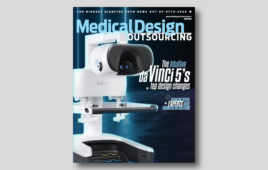
RFPi’s iCertainty shows images of blood flow and perfusion without contact with the patient.
FDA has cleared RFPi’s iCertainty real-time, noninvasive blood flow and perfusion imaging medical device for use during surgical procedures, the company said.
iCertainty is the first medical imaging device to show blood flow without interrupting a surgical procedure or requiring injections, dyes, radiation or direct patient contact, according to the Greenville, N.C. company. Use of iCertainty during surgery could reduce procedural complications or repeat surgeries, reduce hospital costs, and objectively measure and help to improve clinical outcomes, the company said in a prepared statement.
FDA has cleared iCertainty for imaging blood flow and perfusion in tissue up
to a depth of 4-5mm. Initial applications could involve gastrointestinal and plastic surgeries as well as lower-leg vascular procedures, according to the company.
“Repeat surgery rates in iCertainty’s target indications run as high as 20% –
a figure that masks a tremendous amount of patient discomfort, uncertainty and
inconvenience, as well as financial loss for hospitals and insurers,” said RFPi CEO Jeffery Basham. “iCertainty offers an entirely new and advanced standard of imaging detail, speed, ease and flexibility that should benefit surgeons, hospitals and third-party payers – and, most importantly, the patients they all care for.”
The technology behind iCertainty, known as multi-spectral physiologic visualization (MPSV), uses low-energy lasers, high-speed imaging cameras and proprietary analysis
techniques, and flow-calculation algorithms to deliver real-time visualization and
quantification of blood flow and perfusion.
RFPi closed on its Series A round of financing in May 2017 and is securing Series B
financing now to commercialize iCertainty. The company has also secured a federal grant to examine whether MSPV can accurately monitor a patient’s basic cardiovascular parameters at the point of care without touching the patient, and then transmit that information to other healthcare providers. The implications there are substantial, especially in trauma-care or battlefield situations, Basham said.
RFPi researchers also are developing a mobile device that could prove useful in
outpatient settings, particularly in the field of wound care and diabetes clinics, the company said.




![A photo of the Medtronic GI Genius ColonPro polyp detection system flagging a potential sign of colon cancer during a colonoscopy. [Photo courtesy of Medtronic]](https://www.medicaldesignandoutsourcing.com/wp-content/uploads/2024/04/Medtronic-GI-Genius-doctors-268x170.jpg)